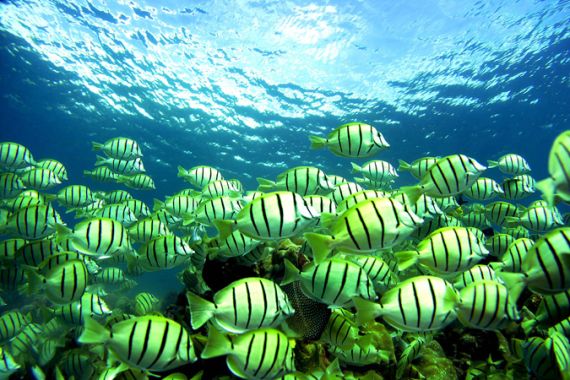UN deal struck to ‘save ecosystems’
Almost 200 countries sign up to key targets on pollution, forest and reef protection, and creating conservation areas.

 |
| The deal will protect forests, coral reefs and ocean in an attempt to preserve the planet’s biodiversity [GALLO/GETTY] |
The world’s most threatened species are to benefit from a UN plan to protect world’s forests, coral reefs and other fragile ecosystems.
A summit of rich and poor nations in Japan agreed on Saturday to take “effective and urgent” action to curb the destruction of the biodiversity upon which human survival depends.
Keep reading
list of 4 itemsAfter the Hurricane
World’s coral reefs face global bleaching crisis
Why is Germany maintaining economic ties with China?
Delegates from 193 countries agreed to key targets on pollution, forest and reef protection and the creation of conservation areas.
“This is a day to celebrate,” Achim Steiner, the UN environment programme chief, said after the accord was struck following almost two weeks of negotiations in the Japanese city of Nagoya.
Clear targets
Anshuman Saikia, the regional spokesman for the International Union for Conservation of Nature based in New Delhi, told Al Jazeera this was the first such success in terms of the convention on biodiversity.
“There are clear targets, clear mechanisms of trying to reduce or even reverse the loss of biodiversity.
“What is different in terms of this treaty is that it has adopted a strategic plan as opposed to just a target and a series of indicators related to the target.”
Saika said the strategic plan has also clearly identified sub-targets, which has not happened in the past to this extent.
“What is more significant is the adoption of an access- and benefit-sharing plan protocol, as well as the financing plan for the implementation of this strategy.
“There are also commitments from countries such as France and Japan, which is a quantum leap of resources for biodiversity conservation,” he added.
‘Strong message’
Environmental groups said that the 20-point plan offered hope that the international community could help to solve environmental challenges facing the planet and would raise awareness about biodiversity issues.
“Governments have sent a strong message that protecting the health of the planet has a place in international politics and countries are ready to join forces to save life on Earth,” Jim Leape, the director-general of WWF International said.
One of the key parts of the accord was a commitment to protect 17 per cent of land and 10 per cent of oceans where many endangered species live.
Greenpeace, however, said it was disappointed with the agreement because it did not cover more of the world’s habitats.
“Alarm bells have been ringing for decades, and developed nations have been hitting the snooze button by delaying both action on and funding for environmental protection,” Greenpeace said in a statement.
Delegates had lowered their initial targets after coming under pressure from China and other developing stories.
Last-minute breakthrough
The deal was signed after a last-minute breakthrough pulled the talks back from the brink.
“We’re delighted there’s been a successful outcome to these long and tortuous negotiations and I think it shows that these multilateral negotiations can deliver a good result,” Peter Cochrane, the head of Australia’s delegation in Nagoya, said.
Another key area, which took almost 20 years to negotiate, was an agreement on genetic resources.
The protocol sets rules on how nations manage and share benefits derived from forests and seas to create new drugs, crops or cosmetics.
The protocol could unlock billions of dollars for developing countries, where much of the world’s natural riches remain.
Karl Falkenberg, head of the European Commission’s environment department, said the accord would not only save species, bit would also fight poverty.
“We finally have something that is going to give great results for the environment, for the poor people,” who will be able to earn money in exchange for access to genetic materials, he said after the talks ended.